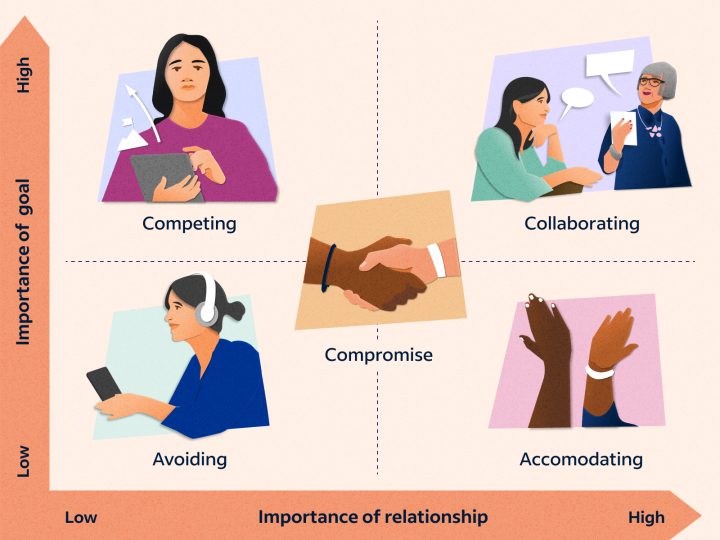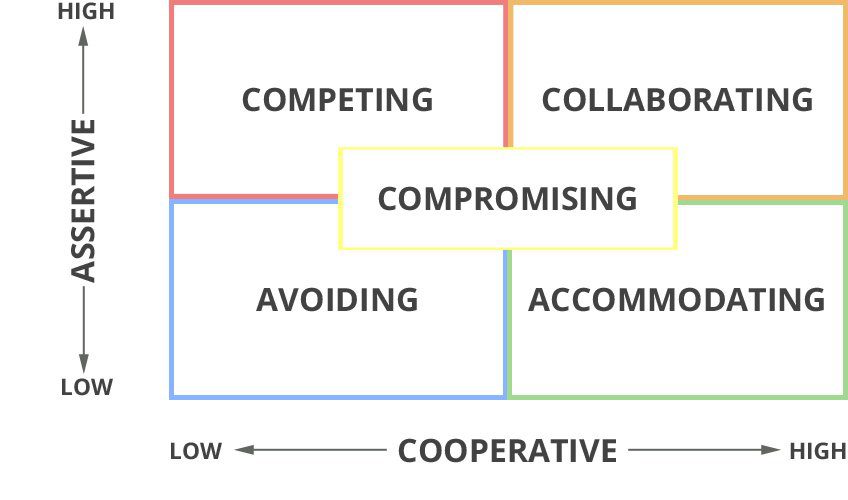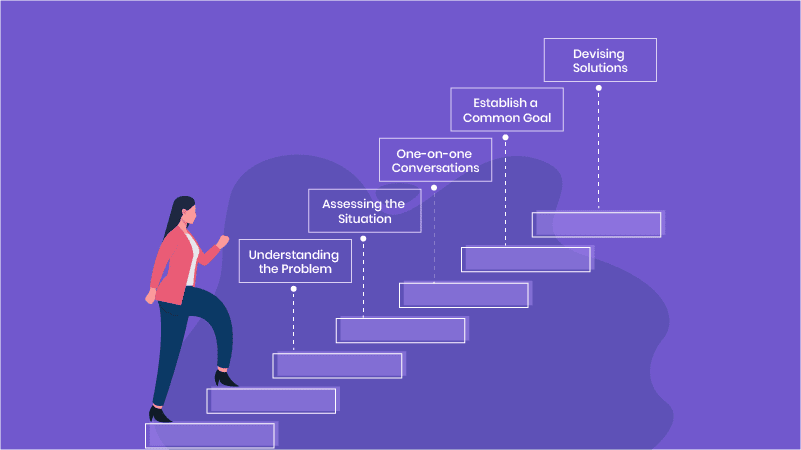Conflict is a natural part of human interactions, and it can arise in various settings, including personal relationships, work environments, and social groups. Effective conflict management skills are crucial for resolving conflicts and preventing them from escalating into more serious issues. Here are some key skills for managing conflicts:
- Active listening: Listening is an essential skill for resolving conflicts. It involves paying attention to what the other person is saying, asking clarifying questions, and summarizing their points to ensure you understand their perspective.
- Emotional regulation: It’s important to regulate your emotions when resolving conflicts, as strong emotions can cloud your judgment and escalate the situation. Take a deep breath, stay calm, and avoid getting defensive.
- Collaboration: Seek to find a solution that works for both parties, rather than trying to “win” the conflict. This may involve compromising, finding a middle ground, or coming up with a creative solution.
- Effective communication: Communicate clearly and respectfully, and avoid using accusatory or inflammatory language.Problem-solving: Identify the root cause of the conflict and work together to find a solution that addresses it. Brainstorm potential solutions and evaluate them based on their feasibility and effectiveness.
- Negotiation: Negotiate in good faith and be willing to make concessions. This can help you find a solution that works for both parties and maintain a positive relationship.
By developing these conflict management skills, you can effectively resolve conflicts and prevent them from escalating into more serious issues.

What are conflict management skills?
Conflict management skills refer to the abilities and strategies used to handle and resolve conflicts in a constructive and effective way. These skills can be applied in various settings, such as personal relationships, work environments, and social groups.
Effective conflict management skills typically include active listening, emotional regulation, empathy, collaboration, effective communication, problem-solving, and negotiation. These skills help individuals navigate conflict situations in a way that promotes understanding, respect, and positive outcomes.
Active listening involves paying close attention to the other person’s perspective, asking clarifying questions, and summarizing their points to ensure mutual understanding. Emotional regulation refers to the ability to manage one’s own emotions and reactions during a conflict, staying calm and avoiding defensiveness. Empathy involves understanding and considering the other person’s feelings and perspective. Collaboration focuses on finding solutions that work for both parties, rather than trying to “win” the conflict. Effective communication involves clear and respectful communication that focuses on the issue at hand. Problem-solving involves identifying the root cause of the conflict and finding creative solutions to resolve it. Finally, negotiation involves seeking a mutually beneficial solution through give-and-take bargaining.
By developing conflict management skills, individuals can effectively manage conflicts, prevent escalation, and promote positive outcomes.

What are the 5 conflict management strategies?
There are five primary conflict management strategies, which are as follows:
- Competing: This strategy involves pursuing one’s own goals or interests at the expense of the other party’s goals or interests. It can be effective in situations where quick and decisive action is needed, but it can also create tension and damage relationships.
- Collaborating: This strategy involves working with the other party to find a solution that meets both parties’ goals or interests. It can be effective when there are opportunities for mutual gain, but it requires open communication and trust between the parties.
- Compromising: This strategy involves finding a middle ground between the parties’ goals or interests. It can be effective when both parties are willing to give up something to reach a solution, but it may not satisfy either party completely.
- Avoiding: This strategy involves avoiding or postponing the conflict. It can be effective when the issue is minor or when emotions are running high, but it may not resolve the underlying problem.
- Accommodating: This strategy involves putting the other party’s goals or interests ahead of one’s own. It can be effective when maintaining a positive relationship is more important than the outcome of the conflict, but it can also lead to resentment or a sense of being taken advantage of.
Effective conflict management involves using a combination of these strategies, depending on the situation and the parties involved. It is important to choose a strategy that is appropriate for the specific conflict and to remain open to adjusting the strategy as needed.

8 examples of conflict management skills:
Here are eight examples of conflict management skills:
- Active listening: This involves giving your full attention to the other person, acknowledging their concerns, and asking clarifying questions to ensure you understand their perspective.
- Empathy: This involves understanding the other person’s feelings and point of view, and showing that you are willing to see the situation from their perspective.
- Open communication: This involves being honest and direct in your communication, expressing your thoughts and feelings clearly, and avoiding blaming or attacking language.
- Assertiveness: This involves standing up for your own needs and boundaries while also respecting the needs and boundaries of others.
- Flexibility: This involves being willing to consider alternative solutions or compromises, and being open to changing your own position in order to reach a mutually beneficial outcome.
- Conflict resolution skills: This involves being able to identify the root cause of the conflict, brainstorming potential solutions, and evaluating the pros and cons of each option.
- Emotional regulation: This involves staying calm and composed during a conflict, even when emotions are running high, in order to prevent the situation from escalating.
- Negotiation skills: This involves being able to work collaboratively with the other party to find a solution that meets both parties’ needs, while also being willing to compromise and make concessions.
7 best practices for conflict resolution :
Here are seven best practices for conflict resolution:
- Address conflicts early: It’s important to address conflicts as soon as they arise, before they have a chance to escalate and become more difficult to resolve.
- Remain calm: Stay calm and avoid reacting impulsively, even if you feel upset or angry. This can help prevent the situation from escalating and make it easier to find a resolution.
- Identify the underlying issues: Try to understand the root cause of the conflict, including any underlying issues or concerns. This can help you find a more effective solution.
- Listen actively: Listen to the other party’s perspective, and make an effort to understand their point of view. This can help build trust and prevent misunderstandings.
- Explore potential solutions: Brainstorm potential solutions together, and be open to compromise and negotiation in order to find a resolution that works for both parties.
- Communicate clearly: Use clear and respectful communication, avoiding blame and judgmental language. This can help prevent misunderstandings and defensiveness.
- Follow up: After reaching a resolution, follow up with the other party to ensure that the issue has been resolved satisfactorily, and to address any remaining concerns or issues.

Conflict management in the workplace:
Conflict is inevitable in any workplace due to differences in opinions, personalities, and work styles. However, effective conflict management in the workplace can help minimize the negative impact of conflicts and promote a positive and productive work environment.
Here are some strategies for conflict management in the workplace:
- Foster open communication: Encourage employees to express their opinions and ideas in a respectful and constructive way, and create opportunities for open dialogue.
- Train employees in conflict management skills: Provide training and resources to help employees develop conflict resolution and communication skills.
- Address conflicts promptly: Address conflicts as soon as they arise, before they have a chance to escalate and cause further problems.
- Use a collaborative approach: Encourage employees to work together to find a solution that meets everyone’s needs, rather than pursuing their own individual goals.
- Use an objective approach: When addressing conflicts, focus on the facts of the situation, rather than emotions or personal biases.
- Encourage compromise: Encourage employees to be open to compromise and negotiation in order to find a mutually beneficial solution.
- Follow up: After a conflict has been resolved, follow up with employees to ensure that everyone is satisfied with the outcome and that there are no lingering issues.
By implementing these strategies, employers can create a positive and productive work environment, where conflicts are managed effectively and employees are encouraged to work together to achieve common goals.
Improving conflict management skills:
Improving conflict management skills takes practice and self-reflection. Here are some steps you can take to improve your conflict management skills:
- Self-awareness: Reflect on your own emotions, reactions, and communication style in conflict situations. Ask yourself what triggers your reactions and what you can do to manage your emotions more effectively.
- Active listening: Practice active listening by paying full attention to the other person’s perspective and asking open-ended questions to clarify their point of view.
- Empathy: Try to understand the other person’s emotions and perspective, and acknowledge their feelings and concerns.
- Communication: Practice clear and respectful communication, using “I” statements to express your thoughts and feelings, and avoiding blaming or attacking language.
- Conflict resolution skills: Learn conflict resolution techniques and practice them in real-life situations. Evaluate what works and what doesn’t, and adjust your approach accordingly.
- Flexibility: Be open to considering different perspectives and solutions, and be willing to adjust your own position to reach a mutually beneficial outcome.
- Role-play: Practice conflict resolution scenarios with a trusted colleague or friend, and get feedback on your approach.
By consistently practicing these skills, you can become more effective at managing conflicts in your personal and professional life. It’s important to remember that conflict management is a process, and that it takes time and practice to master these skills.










